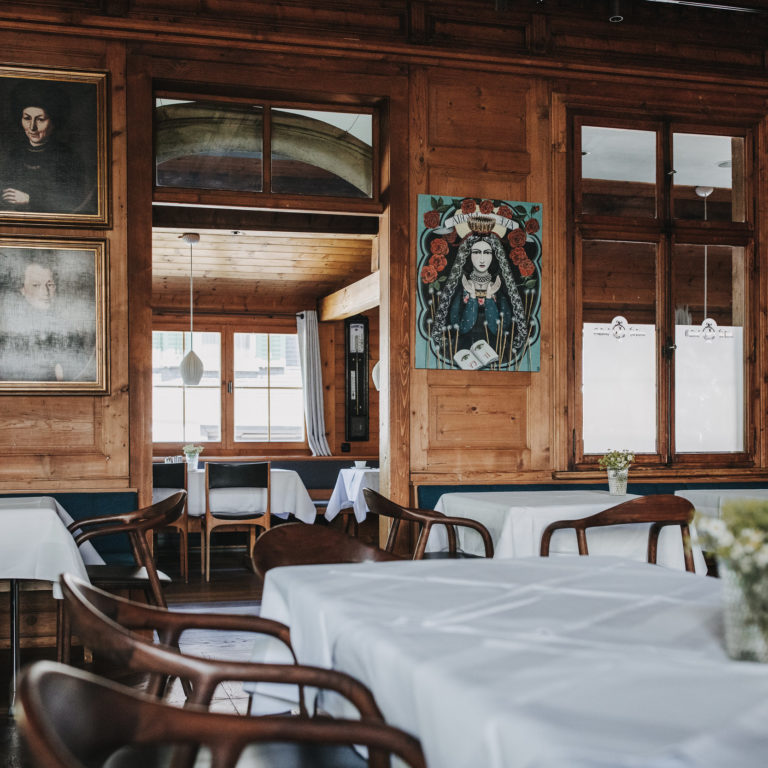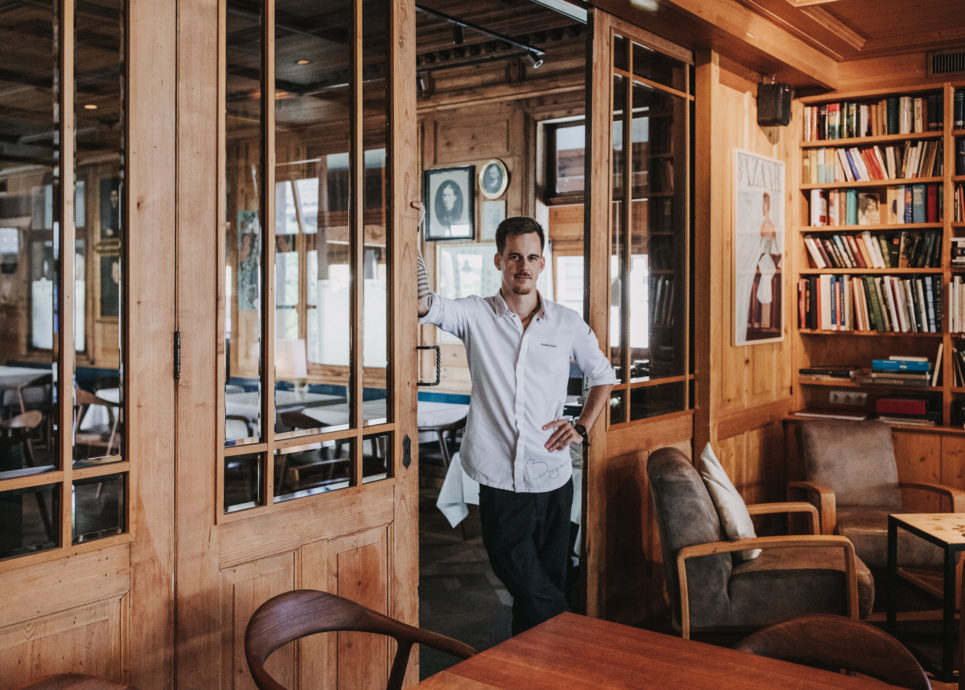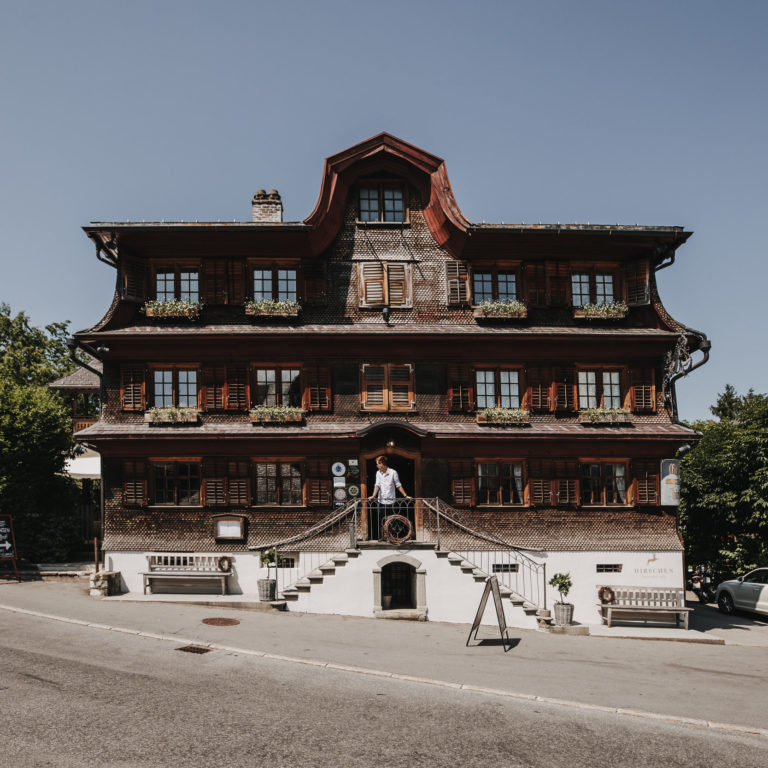


“‘Hirschen’ is a traditional establishment, where guests can enjoy Spaetzle, or boiled beef and a schnapps in winter after skiing. That is our mission.”

C Jonathan Burger outside Hirschen Schwarzenberg © Angela Lamprecht / Vorarlberg Tourismus
Jonathan Burger
Jonathan Burger is head chef at Hotel Gasthof Hirschen in Schwarzenberg. During our visit, he reflects on what makes his job attractive, the challenge of working in a renowned establishment, and his approach as a young chef leading a creative kitchen staff. As a sample of their work, he prepares a regional interpretation of a ceviche.
TEXT: DANIELA KAULFUS
August 2019
The hotel and inn has held pride of place in the town since 1755, slightly overlooking the church and village fountain. After the major fire that engulfed the centre of Schwarzenberg, ‘Hirschen’ was rebuilt immediately. It has seen a lot of action, and seen generations of international guests come and go. It has always been full of artistry and creativity, which is now expressed perfectly in the individually decorated artists’ rooms, the varied ‘wälderness’ event series and not least in its cuisine.
The ten-strong young team led by head chef Jonathan Burger is responsible for the cuisine. Burger, just 29 years old himself, was cooking in New Zealand only two years ago, until hotel owner Peter Fetz, who had just followed in his father’s footsteps, persuaded him to join the traditional establishment in Schwarzenberg. “I was happy to leave my beach house behind for the ‘Hirschen’,” comments Jonathan Burger with a laugh, strolling into the large dining room with the visitors, where he sits down and rests his tattooed arms on the table hand-crafted generations previously. A harmonious blend of eras.
It was a kind of homecoming for the young man from Wolfurt. He completed his culinary training in the Bregenzerwald region, which he considered less of a privilege at the time than he does now. “It wasn’t until after my training that I noticed how beautiful the area is,” admits Burger. Today, he appreciates it all the more and draws strength and creativity from it. “The tranquillity, nature and serenity here are an ideal balance. My job means delegating a lot of tasks, organising, formulating, writing quotes, ordering products. I’m creative when I’m outside, for example picking herbs and clover by the Bregenzer Ach river or at the top of a mountain with a view of Lake Constance. It may sound romantic, but is important for me to clear my mind. ”
He is happy to pass on his knowledge. He first headed up a team at the age of 22, and trained under star chef Christoph Zangerl for three years. “He taught me a lot about leadership. Social skills are often underestimated in the kitchen. You work very closely together in confined spaces, often in stressful conditions, so employee motivation plays a vital role.” He breaks down what that means in detail: “First: No screaming, after all we’re all working towards a common goal. Second: I let everyone be creative, which is why the trainees and dishwashers attend our meetings. Everyone has different ideas, and that is a good thing. It is no good if I try to force everyone to do what I want,” says Burger from experience, and you readily believe him.
He has a clear strategy when it comes to choosing produce. “Roughly three quarters of everything we purchase is regional thanks to our good relationships with local producers, and I’m working on increasing this figure. That’s no problem with meat. I wish I could source more vegetables locally, but am delighted to have Vetter’s organic farm in Lustenau. I would love there to be more innovative vegetable farmers,” he says.
Our eyes wander along the huge glass receptacles filled with elder and berries over the bar, where guests of the house and locals enjoy themselves every evening. They are labelled ‘Elder Vinegar’, ‘Kombucha’, ‘Raspberry Shrub’ for example – all sourced locally, and home-made, of course. Regionality is a “blessing and a curse,” grins Burger, adding: “It inspires us and I have learned to deal with it. We make a lot of preserves and ferment foodstuffs. For example, when the elder blossoms, we have a lot of work to do. We have a lot of storage space, which really helps,” he says. “Our ‘Carte Blanche’ concept lets me go fully regional. If a farmer has four goats, we put them on our menu. Once all of one kind of produce is gone, we offer something else from the region.”
The narrow, cosy corridor at ‘Hirschen’ takes you to the building’s catacombs, where Burger works. Fish is on the menu today – but ‘only’ as a taster for the visitors. “I’m making a ceviche, a light summer dish originally from South America. Or my regional interpretation of the dish, to be more precise,” explains the young head chef, to rising curiosity among the listeners. His colleagues in the kitchen are working on white bread and fresh herbs to prepare for the evening. Subtle fragrances of balsamic vinegar and lemon – the ingredients of the pickle juice in which the asparagus has been ‘fermenting’ since May – blend into the general aroma in the air. Beside it on the polished stainless steel surface, lies lake trout, dill, trout caviar and exotic-looking coriander blossoms “from the Vetterhof farm in Lustenau,” reveals Burger, adding: “You wouldn’t believe what we can grow here in the region.” He bones, skins and fillets the fish with nimble movements, slices it finely and arranges it skilfully on the plate. Burger then shaves wafer-thin slivers of asparagus over the fish, spreads plucked dill, garnishes the dish subtly with the caviar and some coriander blossoms. He drizzles elder vinegar over the dish. “There is finely chopped chilli in the vinegar, but so little that guests don’t really notice that, just that the flavour experience is more intense than usual.”
The way to the guest areas takes us up the stairs, along the narrow passage to the parlour immediately beside the main entrance of the ‘Hirschen’. As anyone who ever stayed here knows, the cosy atmosphere makes it a wonderful place to relax and treat yourself. Jonathan Burger takes a seat on a corner bench and reflects on developments in the culinary world. “I don’t follow trends,” he explains, “but I am taking an increasingly minimalist approach. In recent years, I think there were generally too many components on the plate. We have to prepare menus, sometimes for small groups and sometimes for one hundred or more people. Reducing our focus means that there is little left over, everything gets used up.” He and his team create their own recipes. He sums up his approach as follows: “I haven’t looked at cookbooks in months, that is the most important thing I have learned. It inspires me to be more creative. I have been reading more specialist literature, for example on preserving and fermenting.” Of course the menu also contains traditional dishes like Schnitzel, Kässpätzle (cheese spaetzle) and Riebel (corn semolina mash). “It’s not all about creativity. ‘Hirschen’ is a traditional establishment, where guests can enjoy Spaetzle, or boiled beef and a schnapps in winter after skiing. That is our mission.”
Burger also strives to keep the hospitality trade young and fit, which is why he is happy to take on trainees – and currently has one vacancy. “I like to breathe new life into our industry, and help young people fall in love with the job. Our clientèle is mixed too. We are seeing a clear trend that more and more young people are dining out, and are very open for certain dishes. We cook animals nose to tail, including entrails. Guests try them and like them. That is an important motivation for me, knowing that everything is being used and that the old tradition of hospitality lives on.”
After the taster in the parlour, Jonathan Burger leads us through the sunny garden. “We’re currently enlarging our herb garden, in particular to add special herbs like estragon.” He plucks a few stalks and hands them around to the members of the small group. We rub them between our fingers, the fragrance wafts up to our noses. A few flower beds will soon give way to aromatic plants. As we stroll through the lush greenery towards the seminar building, it is easy to picture it. Fragrant herbs and different shades of green not only whet the appetite, they are also creative inspiration. The effects can clearly be seen in Burger and his team.